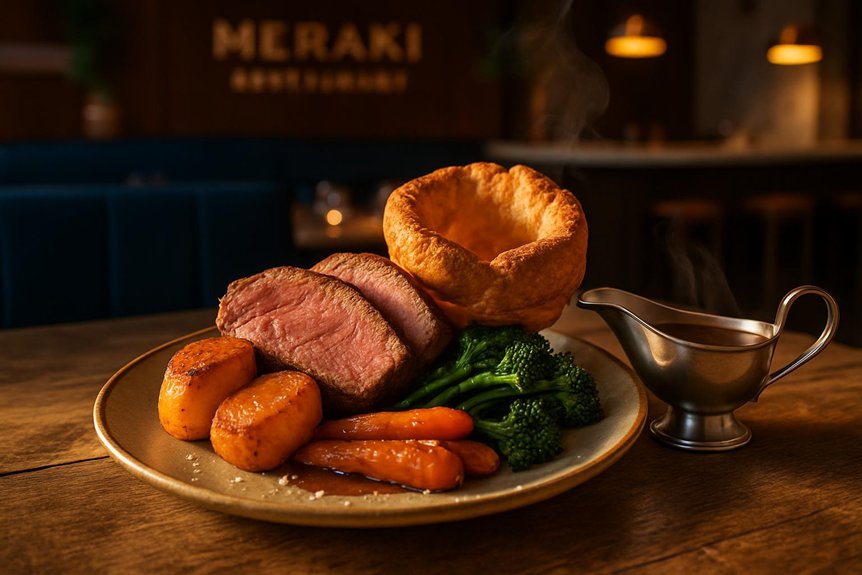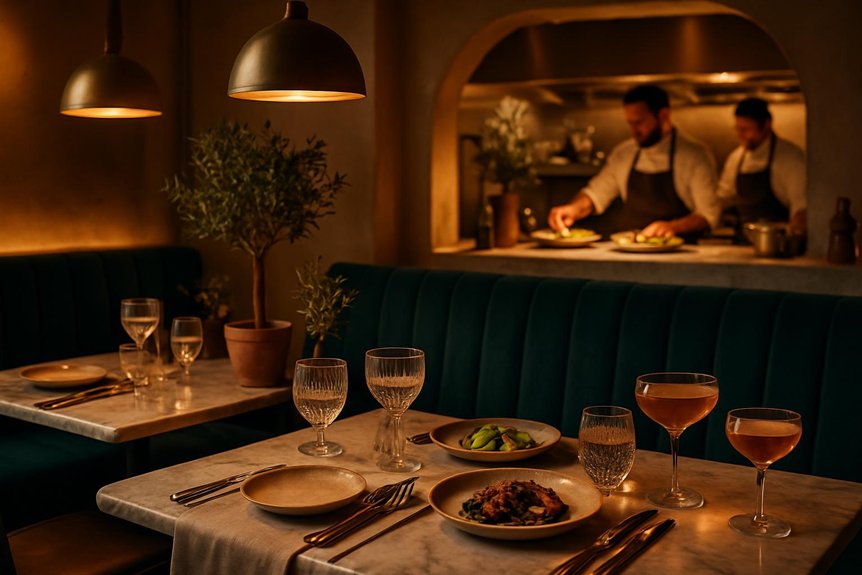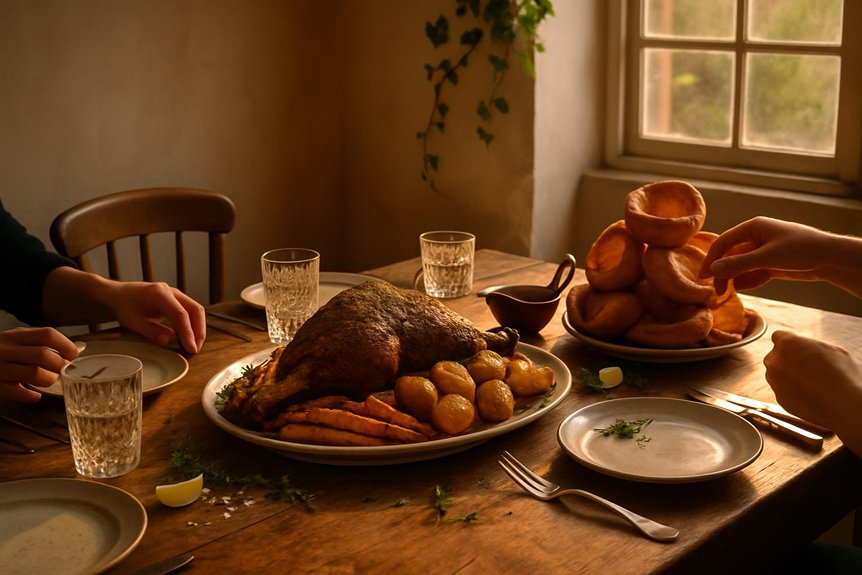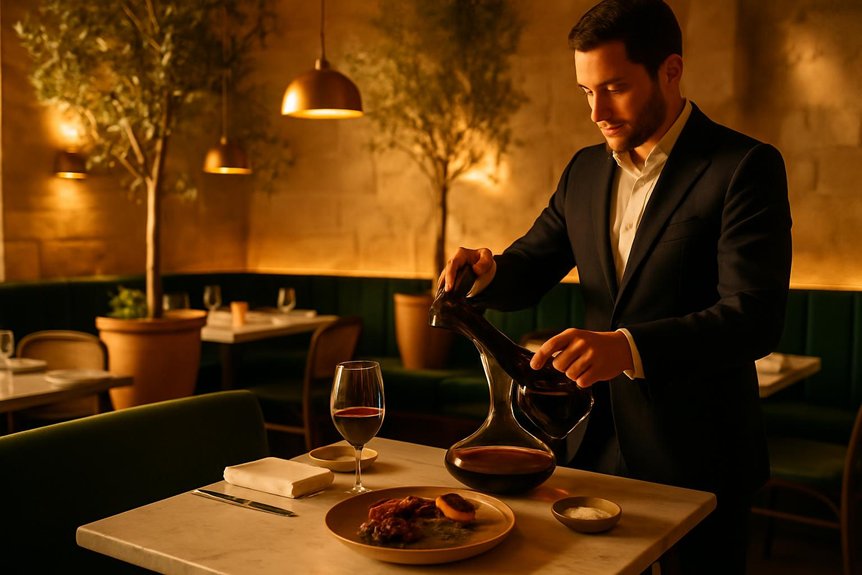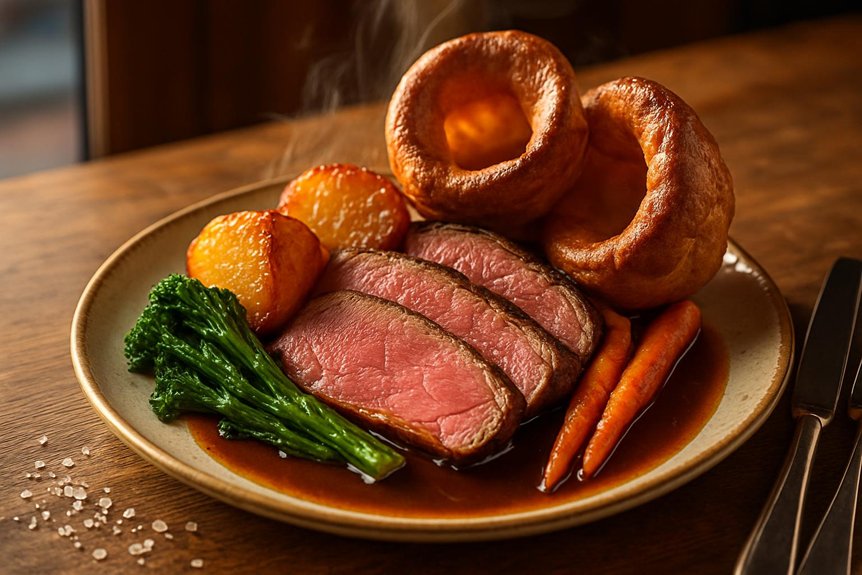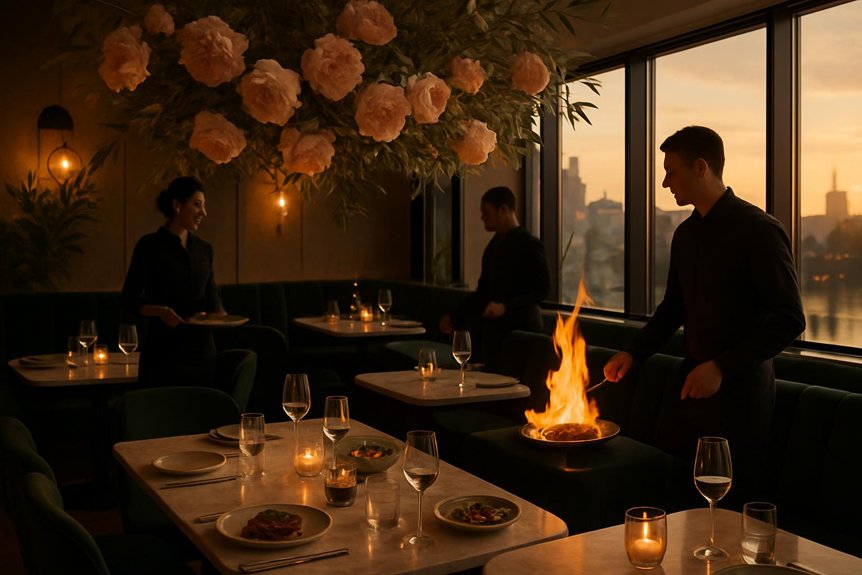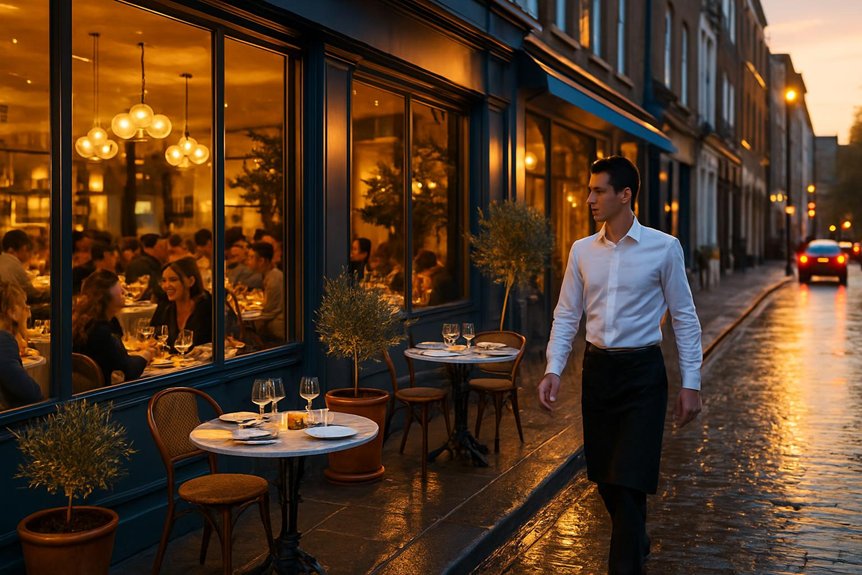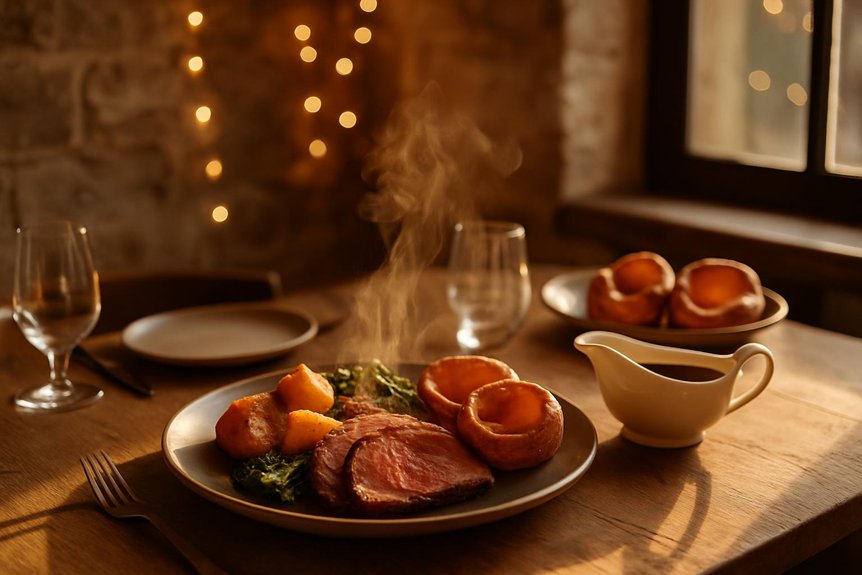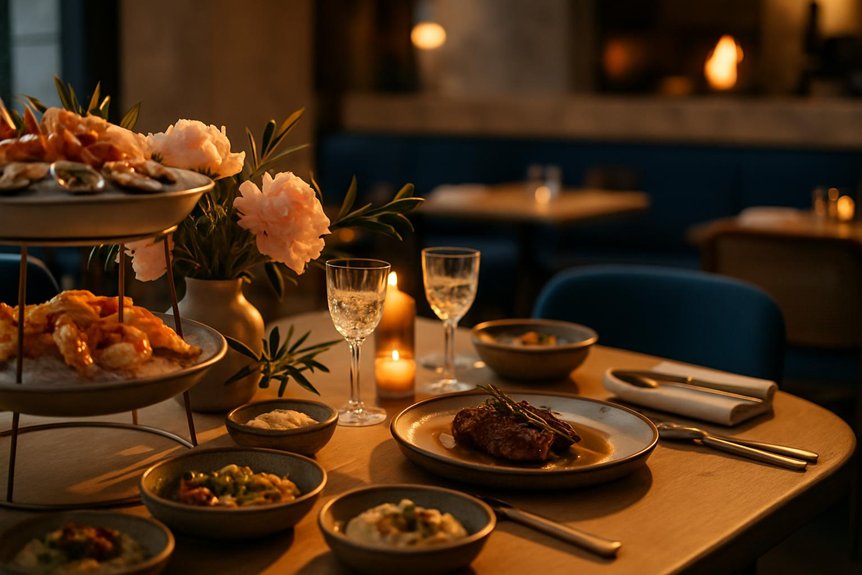Meraki Restaurant approaches the Sunday roast with a Mediterranean lens. The kitchen favors slow-roasted meats, herb-bright sauces, and crisp vegetables sourced close to home. Greek-leaning cocktails and a restrained elegance shape the experience. It feels familiar, yet distinctly coastal. The focus is precision over pomp, sustainability over show. What arrives at the table reframes a comfort ritual without abandoning it. The question is how far this reinterpretation goes—and what it reveals about London’s taste now.
A Mediterranean Take on a British Classic
How does Meraki reinterpret London’s comfort-food canon through a Mediterranean lens? It approaches the Sunday table with a measured blend of Mediterranean flavors and British traditions, keeping the ritual intact while changing its accents.
Seasonal produce leads: citrus-bright dressings lift earthy sides, herbaceous oils replace heavy gravies, and briny notes underscore sweetness in root vegetables. Textures are tuned—crisp edges, tender centers, and clean finishes—supporting balance over heft.
The kitchen favors olive oil, thyme, oregano, and lemon to frame familiar comforts without obscuring them. Yorkshire-inspired accompaniments appear lighter, yet structurally faithful. Sauces skew toward emulsions and reductions emphasizing clarity.
The result is restrained, not showy: recognizable silhouettes, new aromatics. Diners encounter a Sunday plate that respects memory while inviting a sunnier, coastal palate. Meraki Bar, known for its bohemian gypset vibe, offers a unique atmosphere that enhances the Mediterranean dining experience, providing a sensory escape reminiscent of Mykonos.
The Art of Slow-Roasted Meats
Meraki approaches slow-roasted meats by starting with premium cuts chosen for balanced marbling and consistent texture. Thoughtful marinades and spice rubs layer citrus, herbs, and warm aromatics to build depth without overshadowing the meat. Low-and-slow roasting then coaxes tenderness and concentrates flavor, yielding clean slices and succulent juiciness. Known for its cosmopolitan Greek atmosphere, Meraki also offers an array of Greek wines to complement their dishes.
Selecting Premium Cuts
Three fundamentals guide the selection of premium cuts for slow roasting: balanced marbling, connective tissue, and uniform thickness.
At Meraki Restaurant, beef selection prioritizes structure over trend, ensuring moisture retention and tenderness during long cooks. Cuts like ribeye cap, chuck roll, and brisket flat are favored for their fat distribution and collagen. While leg of lamb and pork shoulder offer similar virtues.
Precision in trim and size prevents uneven doneness and maintains a clean roast profile without relying on embellishments.
- Choose muscles with visible intramuscular fat; avoid coarse exterior fat caps that render poorly.
- Seek cuts rich in collagen—shoulder and chuck—ideal for gentle, prolonged heat.
- Standardize thickness to stabilize cooking time and texture.
- Prioritize consistent grain direction for predictable slicing and juiciness.
Meraki Restaurant is renowned for its modern and stylish décor, complementing its culinary offerings with an inviting ambiance that enhances the dining experience.
Marinades and Rubs
A restrained marinade or rub supports slow-roasted meats by enhancing natural character rather than masking it. At Meraki, chefs favor clean foundations: fresh herbs, citrus zest, cracked pepper, and discreet sweetness from honey or date syrup.
Marinade acids—lemon, verjus, or yogurt—are measured to gently loosen surface fibers without pushing the meat into ceviche-territory. Salt is calculated early to promote seasoning equilibrium, while oil carries aromatics and ensures even adhesion.
Rub balance is treated as engineering. Coarse sea salt anchors, brown sugar calibrates browning, and spices like coriander, cumin, and Aleppo pepper add lift without heat dominance. Texture matters; granule size dictates crust integrity and moisture retention.
Aromatic echoes—rosemary smoke, garlic powder, and fennel seed—align with each cut’s innate fat and minerality.
Low-And-Slow Techniques
Though patience is the silent fuel, low-and-slow cooking is governed by control: steady heat, calibrated humidity, and disciplined timing. At Meraki, chefs treat connective tissue as an ally; gentle heat coaxes collagen into silk, yielding meat that yields at a nudge.
Precision temperature control—whether in an oven, smoker,, or slow cooker—prevents dryness, allowing fat to baste and aromatics to permeate without harsh Maillard bitterness.
- Target temperatures: beef at 120–130°C for hours, pork slightly lower to preserve moisture.
- Moisture management: pans with water, sealed trays, and periodic mopping stabilize humidity.
- Resting discipline: extended rests equalize juices, tightening slices without leakage.
- Finishing strategy: a final high-heat kiss crisps exteriors while cores stay tender.
The result: clean flavors, supple texture, and reliable repeatability.
Herb-Bright Sauces and Flavorful Jus
Meraki’s plates are lifted by vibrant herb emulsions that add freshness without overpowering the meat.
A zesty citrus gremolata supplies brightness, sharpening each bite with aromatic zest and parsley.
Rich pan drippings are reduced into a glossy jus, binding the elements with savory depth.
Vibrant Herb Emulsions
Herb-bright emulsions and concentrated jus deliver clarity and lift to Meraki Restaurant London’s plates, channeling garden aromatics into precise, silken sauces.
The kitchen balances chlorophyll freshness with savory depth, translating herb infusion techniques into textures that cling to roast surfaces without masking them.
Cold-blended oils, blanched greens, and gentle acids build sheen, while reduced bones or vegetable stocks provide structure for plant based alternatives.
- Emulsion architecture: stabilized with lecithin or egg, spun to a fine, green gloss that coats without greasiness.
- Layered extraction: stalks for base notes, leaves for perfume, stems pressed for mineral bite.
- Heat control: brief blanching locks color; ice baths arrest bitterness and preserve volatile oils.
- Service precision: warmed just to nappe, then spooned to frame char, fat, and smoke.
Zesty Citrus Gremolata
From those chlorophyll-slick emulsions, the kitchen shifts to a raw, incisive garnish: zesty citrus gremolata that electrifies roasted meats and grilled fish without weight. It is assembled to order, keeping leaves bright and oils restrained. Finely chopped parsley anchors the mix; garlic provides a quick, clean thrum.
Lemon and orange citrus zest drive flavor enhancement, lifted by a squeeze of juice added sparingly to avoid dilution. A touch of olive oil barely binds, encouraging scatter rather than sauce. Across Meraki’s roast program, this gremolata supplies snap and lift. It wakes charred edges, cuts richness, and sharpens marinade notes without masking them.
Pith-free peel ensures purity; knife-work preserves texture. The result is aromatic, vivid, and disciplined—an herb-bright accent that resets the palate between bites.
Rich Pan Drippings Jus
A rich pan drippings jus channels the roast’s own caramelized fond into a concentrated, glossy finish that marries depth with clarity. At Meraki Restaurant London, the kitchen refines this classic through disciplined cooking techniques and precise ingredient pairing, yielding a sauce that feels both modern and elemental.
Deglazing captures browned residues; reduction calibrates salinity and body; a final mount of butter tightens sheen without dulling aromatics.
- Deglaze with dry Madeira or English sparkling wine to lift fond while keeping fruit and acidity in balance.
- Layer thyme, bay, and crushed garlic early; add tarragon late to preserve brightness.
- Balance umami with a dash of anchovy essence, then counter with lemon zest.
- Serve with roasted carrots or charred leeks for textural contrast.
Golden Potatoes and Seasonal Vegetables
How better to understand Meraki’s commitment to simplicity than through its golden potatoes and seasonal vegetables, rendered with restrained finesse? The potatoes arrive crisp-shelled, steamed within, their edges fractured just enough to catch heat and salt. A measured gloss of aromatics—never greasy—keeps them buoyant beside roast meats, vegetarian mains, or vegan sides.
Seasonal vegetables are treated with equal economy: briefly blistered greens, sweet roots cut to uniform heft, and brassicas left with a lively snap. Seasoning is disciplined—citrus, a pinched herb, or a nutty finish—so each element tastes of itself.
Portions are balanced, not excessive, placed to support rather than overshadow. The effect is coherence on the plate: texture, temperature, and clean flavors aligning to frame the roast without theatrics.
From Market to Table: Fresh, Local Produce
Meraki’s kitchen builds its menus around produce sourced directly from nearby farms, keeping transport minimal and quality high. Seasonal ingredients take the spotlight, with selections shifting as fields and orchards change.
This approach guarantees flavors remain vivid, traceable, and aligned with the rhythms of the region.
Sourcing From Local Farms
The kitchen’s commitment to local sourcing begins at dawn, when chefs review deliveries from trusted farms across the Home Counties. Producers are selected for humane husbandry, soil health, and short transport routes, ensuring traceable quality for the Sunday roast. Partnerships extend to local breweries for malted barley glazes and spent-grain bread, while sustainable packaging reduces waste in transit and storage.
Procurement focuses on transparency, with regular farm visits and seasonal planning aligned to livestock cycles.
- Grass-fed beef and lamb from regenerative pastures, verified by independent audits.
- Heritage potatoes and brassicas harvested within 24 hours of service.
- Small-batch butter, oils, and vinegars sourced directly from artisan makers.
- Collaborative logistics with couriers using reusable crates and temperature-stable, sustainable packaging.
Seasonal Ingredients Spotlight
From those early-morning farm drops, the day’s menu tightens around what is tasting best right now. The kitchen’s mise en place pivots with the crates: brassicas kissed by frost, heritage carrots with vivid tops, and marbled fore-ribs dry-aged to peak. Each component is selected for immediacy, not trend.
This Seasonal Ingredients Spotlight highlights a strict Farm to table rhythm.
Leafy greens are wilted beside roasted roots, their sweetness amplified by low, slow heat. Beef drippings glaze parsnips; cider-reduced jus binds plate to season. Sustainable sourcing guides substitutions: line-caught fish replaces beef when pastures need respite; pulses step in when weather stunts yield. The result is a Sunday roast that reads the market honestly, tastes of place, and wastes nothing.
Craft Cocktails With Athenian Flair
Even before the first sip, glassware chilled to a frost hints at a bar program rooted in Athens yet polished for Fitzrovia. The cocktails lean into Mediterranean fusion, balancing citrus brightness, herbaceous depth, and saline accents. House infusions—masticha, oregano, and thyme—drive cocktail creativity without overwhelming the spirit.
Greek spirits like tsipouro and ouzo appear alongside London dry gin, creating familiar forms with Athenian nuance. Garnishes are purposeful: cured olives, citrus oils, and smoked rosemary amplify structure rather than spectacle.
- Signature martini reimagined with mastiha rinse and lemon verbena bitters.
- Charred citrus highball marrying bergamot soda and island-style rum.
- Olive oil–washed gin sour, silky with preserved lemon and aquafaba.
- Fig-and-thyme Old Fashioned, sweetened with Attic honey reduction.
The Ambiance: Warmth, Buzz, and Hospitality
Soft amber light spills across marble and wood, drawing a steady hum of conversation into focus. The room’s decorative lighting lands in gentle pools, flattering plates and faces without glare. Brass accents glint; linens stay crisp; staff move with practiced ease, greeting regulars and newcomers alike with poised warmth.
Seating is intimate but not cramped, allowing tables to feel part of the buzz while keeping conversations clear.
As evening deepens, live music folds into the soundscape—acoustic, unobtrusive, timed to service rhythms. It softens edges rather than commanding attention. Temperature, volume, and pacing are carefully managed; no detail feels accidental.
Hosts anticipate needs, servers read the table, and the bar’s quiet theatre feeds the room’s energy. The ambiance supports comfort, not spectacle.
Vegetarian and Seafood Sunday Options
As Sunday unfolds, that measured warmth extends to a menu that favors light, clean flavors without sacrificing indulgence. Meraki balances comfort with restraint, offering plant based options and sustainable seafood that feel celebratory without heaviness.
Vegetables take the lead through fire, smoke, and citrus, while fish is treated with precision to highlight natural sweetness and brine.
- Wood-roasted cauliflower with tahini-lemon and toasted pistachios, finishing with pomegranate for brightness.
- Grilled halloumi and charred courgettes over herbed fregola, punctuated by mint and olive oil.
- Sustainable seafood: line-caught sea bream, fennel, and caper emulsion; octopus gently braised, then seared for snap.
- Aegean-style baked beans, tomatoes, and wild greens, layered with oregano and citrus zest.
Portions suit sharing, inviting contrast between smoke, acid, and subtle sweetness.
Pairing Wines From Greece and Beyond
How best to translate Meraki’s sunny restraint into the glass? The answer lies in a thoughtful wine pairing philosophy that privileges clarity, texture, and provenance.
Greek wines take center stage: Assyrtiko from Santorini slices through rich lamb with salinity and citrus; Xinomavro from Naoussa offers red-fruited lift, fine tannins, and herbal nuance for beef; Agiorgitiko supplies supple plum notes for pork. For roast chicken, a mineral Moschofilero or island Vidiano balances herbs and lemon.
Beyond Greece, cool-climate options complement the menu’s restraint. Loire Chenin brings orchard fruit and waxy depth; white Burgundy adds measured oak and cream; Northern Rhône Syrah supplies pepper and poise. For seafood starters, crisp Txakoli or Peloponnesian Roditis refreshes.
Thoughtful pours emphasize freshness, structure, and discreet elegance.
How to Book and What to Expect on the Day
Curious about securing a table at Meraki? Readers will find booking straightforward: the restaurant’s online system opens peak Sunday slots two weeks ahead, with phone lines accommodating bespoke requests.
Smart reservation tips include selecting late lunch times for calmer service, noting dietary needs in the booking form, and confirming party size 24 hours prior.
For larger gatherings, the team outlines event packages that bundle set menus, wine pairings, and timed courses.
- Book early for Sunday roasts; mid‑afternoon slots offer quicker seating.
- Use reservation tips: add occasion notes, request highchairs, and flag allergies.
- Expect a warm greeting, cloakroom service, and bread on arrival; roasts carve promptly.
- For groups, event packages secure semi‑private areas, fixed pricing, and coordinated pacing.
Conclusion
Meraki’s Sunday Roast reframes comfort through Mediterranean clarity—slow-roasted cuts, herb-bright sauces, and market-fresh vegetables presented with understated elegance. The experience extends beyond the plate to a warm, buzzing room and a measured Greek-leaning drinks list. Particularly, UK diners now eat out for Sunday Roast 28% more often than five years ago, reflecting appetite for refinement without losing tradition. At Meraki, that shift feels natural: coastal nuance, seasonal restraint, and a booking ritual that promises ease rather than ceremony.
